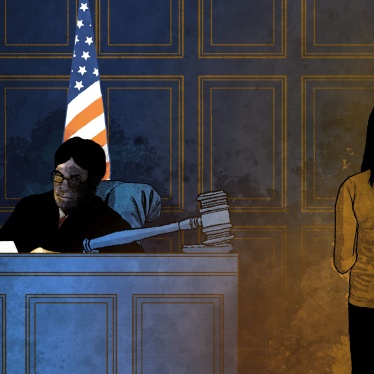"It could have been anyone in this courtroom. Your mother. Your lawyer. It could have been me." The judge drilled down on the random murder of a woman for her car. Edel Gonzalez, a diminutive 38-year-old man, sat shackled in a prison jumpsuit before the bench and nodded in agreement. "It was brutal," the judge repeated with force.
This was not your typical sentencing hearing. It was a historic moment. As the judge talked to the defendant, whispering in the courtroom stopped. The attorneys didn't move, and the guard faded back against the wall. This was a conversation between two people: a judge and a man convicted of murder.
But that man was a boy when the murder was committed in 1991. He was convicted and sentenced to life in prison with no possibility of parole. The United States is the only country that imposes life without parole on people under 18, and in California more than 330 such offenders have received this sentence. Edel was 16 at the time of his crime, and in December, he was back in court as the first case under a new California law.
The law, which went into effect a year ago, permits judges to review the cases of youths who were in effect sentenced to die in prison. It creates a chance for a parole-eligible sentence. It is, in essence, a recognition that a lot has changed since California first started sentencing children in 1990 to life without parole. Advances in neuroscience have made clear that critical brain development continues into the mid-20s for functions essential to evaluating risks, understanding consequences and the ability to resist peer pressure.
I first met Edel in 2007. Seated at a visiting room table in a maximum security prison, he was a somber 32-year-old. I was investigating California's use of life-without-parole sentences for teens. Before his crime, he had been solidly ensconced in a gang since age 11. He had also been suppressing childhood abuse and loss, and dealt with his pain by drinking. He'd never met his father, so older gang members provided his only adult male role models. He was thoroughly drunk when he and two adult codefendants attempted to steal a car. One of the men — not Edel — unexpectedly shot the driver. Edel was convicted of murder for his role and sentenced to life without parole.
When we met, he had been in prison 16 years, and a coffin would be his only way out. He was a man with no reason to hope. Yet he had reflected deeply on why he had been so lost at 16, and described his efforts to be a good person since that time. His virtually pristine prison record supported his claim.
"I am a different person than I was then," he said. "I wish I could change the things I did. But I can try to live an upright life now, even here." When he spoke about his victim, he became overwhelmed. He turned away, hiding tears and shame. "I'd tell her, if I could … I'm sorry. I don't know how to give you my life. I would give you my heart if I could."
In several recent opinions, the U.S. Supreme Court has recognized that, compared with adults, youths have "diminished culpability" for crimes. "Juvenile offenders cannot with reliability be classified among the worst offenders," the high court has stated. "A juvenile is not absolved of responsibility for his actions, but his transgression is not as morally reprehensible as that of an adult."
A few weeks before Edel's December hearing, I got a call from a jail chaplain in another county. He said that a youth had just been sentenced to life without parole and that during sentencing, the judge turned to the boy and said, "You are a monster." His crime was a murder with depressing similarities to Edel's case. A monstrous act, yes — a truth about any murder.
But a child is not a monster. And that is what this law is about. Science and law compel a court to consider the fact that a young person still is developing. No one can know who a 16-year-old will be in 22 years.
Edel listened as the judge condemned his actions 22 years earlier. Nodding in agreement, he too condemned those monstrous acts. But despite two decades of believing he'd never be released, Edel had worked hard to become someone very different from the 16-year-old gang member he had been.
California's law allowed this judge to reconsider a life-without-parole sentence in light of the man Gonzalez had become. He resentenced him to life with the possibility of parole. Edel has no guarantee he'll ever get out, but one day he'll have the chance to go before a parole board. It is a chance every child who commits a crime deserves.







